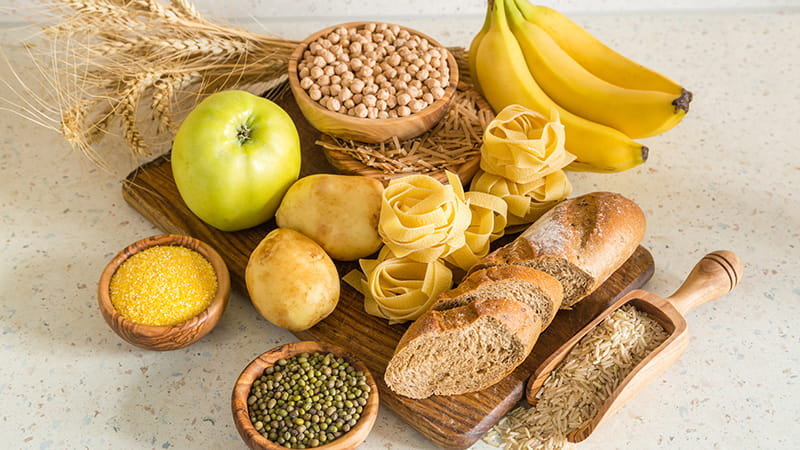Carbohydrates

Carbohydrates provide essential nutrients and are one of the main sources of calories for our bodies. They can all be part of a healthy eating plan.
Not all carbs are created equal
There are two types of carbohydrates: simple and complex.
Simple carbohydrates are digested quickly and send immediate bursts of glucose (energy) into the bloodstream.
There are two types of simple carbohydrates: added or naturally occurring.
Added sugars provide calories, but lack vitamins, minerals and fiber and can lead to weight gain. Naturally occurring sugars are in nutritious foods including fruit and milk. Unlike added sugars, naturally occurring sugars also contain vitamins, minerals and fiber — healthy nutrients our bodies need.
Complex carbohydrates are digested more slowly and supply a slower release of glucose into the bloodstream. As with simple sugars, some complex carbohydrate foods are healthier choices than others.
Refined grains, such as white flour and white rice, have been processed, which removes many beneficial nutrients and dietary fiber. Many foods containing refined grains lack B vitamins and other important nutrients unless they’re enriched.
By contrast, unrefined whole grains, such as brown rice and whole-wheat pasta, retain many of these vital nutrients and are rich in fiber, which supports digestive health. Eating fiber helps you feel full, so you are less likely to overeat these foods.
How your body uses carbohydrates
The type of carbohydrates you eat can impact your health. Foods that contain high amounts of simple carbs (added sugars), especially fructose, raise triglyceride levels, which may increase your risk of cardiovascular disease.
Your body breaks down carbs into simple sugars that are absorbed into the bloodstream. As blood sugar level rises, the pancreas releases a hormone called insulin. Insulin functions to move sugar from the blood into cells, where sugar is used for energy. Simple sugars, such as sugar-sweetened beverages and desserts full of added sugars, are quickly digested and absorbed.
In contrast, complex carbohydrates, such as an apple or a slice of whole-grain bread, take longer to digest and absorb, leaving you to feel fuller longer. These types of complex carbohydrates give you energy over a longer period of time.
Simple carbohydrates are found in foods including:
- Candy
- Honey
- Molasses
- Soda (regular)
- Syrups
- Sugar (white, brown)
- Refined breakfast cereal
Complex carbohydrates can be found in foods including:
- Legumes
- Fruits
- Starchy vegetables, such as sweet potatoes
- Whole-grain products, such as bread, rice and pasta
The American Heart Association recommends:
- Limiting refined sugars. Foods with simple carbohydrates have empty calories and very little nutrition.
- Choosing complex carbohydrates. These foods, such as fruit and vegetables, are loaded with healthy nutrients. Include legumes, beans, lentils and dried peas, too.
- Including whole grains. Enjoy brown rice and whole-grain pasta, breads and cereals.








